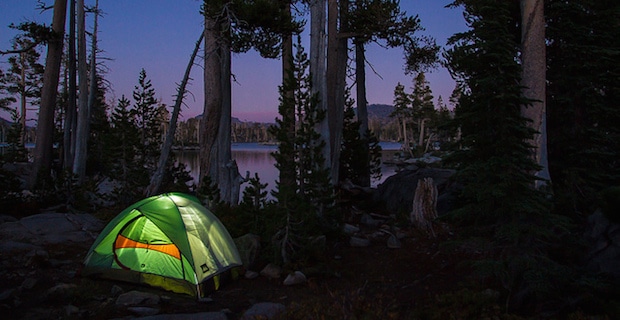
There's nothing quite like slowly waking up to the sound of loons calling to each other, unzipping the sleeping bag and getting that first blast of cool morning air. For many families, camping is a summertime tradition, and for some Americans, the expensive summer holiday has given way to budget-friendly family time around the campfire.
Camping is perhaps the original eco-tourism, and even a few days in the great outdoors presents several opportunities to teach kids about ecology. A handful of peanuts will give young kids an understanding of the chipmunk's swiftness, while a look around your campsite can reveal a number of different plant and tree species. Many state parks run education programs for young campers focusing on local wildlife, plant life and sustainability issues, but if you're looking for something the whole family can enjoy, there are plenty of hiking trails that combine exercise and education. Canoeing along a river system is also a great way to get an up-close view of otters, moose, waterfowl and other creatures.
Read More About Life Lessons Learned on a Health Retreat
But just as camping can offer a view into the unspoiled natural world, the choices you make as a camper can inflict harm on the area.
Even getting to your campsite can carry a hefty carbon footprint. Some campers prefer the comfort of sleeping in an RV (also called a coach or motor home), but your comfort comes at an expense to the environment. According to RV-Coach Online, the average RV gets 5 to 10 miles per gallon (mpg) running on gas, and 9 to 14 mpg running on diesel. By comparison, the Toyota Prius gets 52 mpg. If you need a little more comfort than a tent provides or if you have health issues that are exacerbated by sleeping on the cold, hard ground, consider a tent trailer, which sits up off the ground on a trailer chassis and can be pulled behind a fuel-efficient vehicle.
While you're at it, leave the gas-powered toys at home and take up a green alternative. Instead of zipping along the lake in a motorboat, which uses gas and can kill or injure marine wildlife, paddle the lakes and rivers in a canoe, kayak or raft. If you usually like waterskiing or jet skiing, try windsurfing-it may sound tame by comparison, but you'd be surprised how fast you can get going on a moderately windy day.
When you're loading up the cooler in anticipation of steaks eaten around the campfire, keep in mind the waste your foods will generate. Consider food options with minimal packaging, or pack your foods in resealable, reusable containers, so you don't have to worry about storing the waste. While most campgrounds have a dumpsite, it may be one central location that happens to be a 20-minute drive from your site, so you won't want to trek over several times each day.
It used to be the norm for campers to burn their garbage, and it's still common practice when people are camping along rivers or in the woods. But burning garbage is a bad idea. Several plastics release dioxin, a highly toxic organic chemical, when burned. Campfires produce a relatively low heat compared to the temperatures needed to effectively incinerate plastics, and incomplete combustion can increase the levels of harmful chemicals released into the air. Many of these chemicals have been linked to cancer, endocrine disruption and other health issues, and some are greenhouse gasses that contribute to climate change.
Take garbage and recyclables to the garbage drop-off location or take it home for disposal. Do not leave garbage on your site. Garbage attracts animals such as bears, and when bears find a source of food, they will return again and again, even if they are moved several miles away my park staff. If they continue to return and become a nuisance, they are often shot. One way to keep bears away is to eliminate food scents, so it's important to wash dishes after each meal.
Read About Ideas for Your Summer Bucket List
Be sure to bring along biodegradable, plant-based soap for washing dishes so the soapy waste water won't harm the surrounding environment (unscented options are best). Dispose of dirty dishwater at washroom facilities where possible, or else walk into the bush a fair distance away from your campsite to avoid attracting animals directly to your site. Before you head home, make a sweep of the site, looking for the smallest bits of garbage. Something as simple as cleaning out the fire pit can prevent forest fires caused by warm embers suddenly bursting into flames.
Remember: The key to green camping is leaving the smallest ecological footprint possible. When you leave, it should appear as if you were never there.
Image: Christian Arballo




